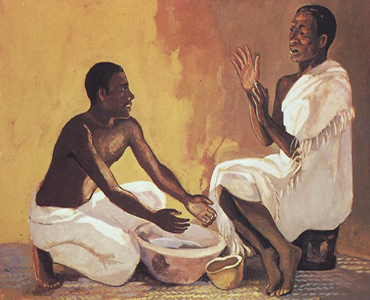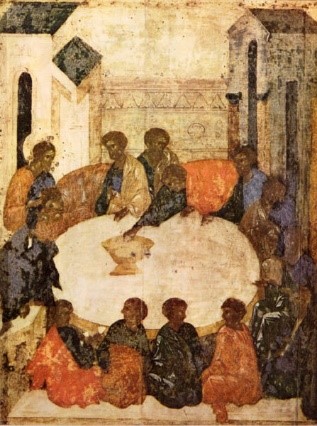Moira writes: Today begins the three holiest days of the Church’s year, the Paschal Triduum. They are holy because in his Passion, Death and Resurrection, Jesus makes humanity ‘whole’ again. He breaks down the barriers of suffering, sin and death. All the things that break us apart, those things that would separate us from God, from each other and even ourselves, these are all ‘put back together’ by his death on the cross and his rising from the dead. Holy Week this year is very different from previous years, but we have been able to participate in Palm Sunday celebrations from home, we have this reflection today and the reflection for Good Friday tomorrow. And even from home, we will be able to share in the joy of Easter Day, rejoicing in the resurrection of our Lord, Jesus Christ.
Our readings today are 1 Corinthians 11.23-26, read by Gudrun and the Gospel according to John, 13.1-17, read by Davie.

Today we reflect on this passage from scripture which shows Jesus reaching out to his disciples in the very human act of washing feet.
Jesus, knowing that the Father had given all things into his hands, and that he had come from God and was going to God, got up from the table, took off his outer robe, and tied a towel around himself. (John 13:3-4)
Jesus knew that his time had come to leave the world and return to his Father. He knew the kind of death he would endure. He knew that his disciples would struggle for a bit without him. He knew he had done all that he could to prepare them for his death and resurrection, but he still felt the need to minister to them one last time as they met together to share in a meal of bread and wine. Jesus also knew that one of his disciples would betray him to the authorities, and yet he continued to wash the feet of all of them. This was a final teaching moment for Jesus. When he put his outer robe back on, Jesus returned to the table and asked this question? Do you know what I have done to you?” The example of care that Jesus showed to his disciples was to be replicated by them, and they were reminded that ‘servants are not greater than their master, not are messengers greater than the one who sent them’.
Peter’s reaction to that act of love and care is summed up beautifully in this short passage from “Love is Never Done” by Carol Dixon, sent to me by Ruth.
It was Mary who started it – who sowed the seed of the idea in my mind to wash the feet of my friends. Her absolute humility, and adoration, as she poured out the perfumed ointment, anointing me for my burial. She didn’t care that others were scandalised, as Peter was when I first knelt to wash his feet, yet in the end he embraced the act with joy. I’ll never know what Judas felt; perhaps he was revolted as I stooped before him, offering my wholehearted love. Something had changed in him the night he saw Mary prostrate herself at my feet; the crisis had been coming for a while. It wasn’t just the money, it was her utter devotion; maybe he suspected he could never match that, and second best was not enough for him. So he distanced himself from me, from the cause, from the kingdom, recoiling from the intimacy that I wanted to share with all as I knelt with bowl and towel. If you had been there, ask yourself, what would you have done?
Last year and this year we have been in periods of lockdown and I suppose it has felt like living in Lent for much of that time. It has been hard at times to stay positive and look for the light at the end of the tunnel. Now, with the vaccine programme rolling out, we can have hope that this pandemic will recede, and we can return to showing God’s love in a more tangible way. God showed his love for his disciples, his friends, in the tangible act of humbly kneeling before them and washing their feet. In our passage from the Gospel of John, we are not told exactly when Jesus performed this act of love, but I would assume that it would be before they had eaten supper, before the act of betrayal by Judas. How do you think Judas must have felt as Jesus washed his feet, knowing that he was about to betray his teacher, his friend? Picture the scene, as they sat at the table. One was ashamed and one was indignant, and yet all shared in the bread and the wine. Peter was afraid that even if Jesus washed his feet he would still not be clean, but Jesus reassured him that it was only Peter’s feet that needed to be cleaned.
During Lent, we usually take time to reflect on the things in our lives that we could make improvements to. Perhaps we have been quick to judge, or slow to recognise the needs of others, or maybe we have lost the ability to be patient and slow to anger. But in these troubled times with so much of our freedoms taken away by the pandemic, perhaps this year we should be reflecting on the everyday things we have been able to do and look for the times of happiness and blessing that have come out of our restricted lives. For me, the simple pleasure of being able to be in my garden on bright sunny days has been a blessing. Having more time to spend walking with my husband and our dog out in the fresh air and getting more exercise has also been a blessing, and the joy of living so close to family and being able to see grandchildren has brought me so much happiness. That being said, all of this has made me more aware of how much we need to have family and friends in our lives. Jesus knew that his disciples would need each other even more once he departed from them, and his act of love for them, the washing of their feet, bound them together and taught them how they should spread God’s love to the world.

Today we also remember the ‘last supper’ the final meal that Jesus shared with his disciples in the upper room. As I searched for an image, I came across this Icon, “The Mystical Supper,” painted by the artist Rublev and I was interested to see that he had painted the scene at a round table rather than the iconic images we see of the Last Supper at a long rectangular table. To me, this image feels more intimate and more in keeping with how I imagine shared meals at the time of Jesus would be. Jesus could see the expressions on the faces of his disciples and would have known who was worried, concerned, anxious or nervous as the meal progressed. It is interesting also to see that some of the figures have been painted in light orange robes and others much darker. Certainly on that night, in that upper room, there were shades of darkness and light at play in the ‘mystical supper.’ Once again Jesus reminds us in this communal act of sharing in bread and wine, of his new commandment, ‘that you love one another. Just as I have loved you, you also should love one another’ (v.34). Over this past year we have been unable to share together in the physical supper of bread and wine, but we have still received God’s Holy Spirit (our spiritual bread and wine) as we worshipped each Sunday at home, whether joining with the Facebook live stream or with the Materials for Worship. This time away from physically being together and receiving the physical elements of communion will make us appreciate even more the joy of sharing God’s love with those around us on Easter Sunday. You may wish to join in with a call to recollection and prayer for forgiveness from Thom M Shuman, which speaks to the strange times we are living in.
Call to Recollection
Now, just as on those nights long ago, we face choices: will we continue to live in fear, or step out in faith?
Will we trust in the One who is with us, or listen to the hollow words around us?
Let us confess our lives, our emptiness, our worries to the One who calls us, feeds us, redeems us, as we pray together, saying,
Prayer for Forgiveness
It has all disappeared, our God, our certainty of how life was to be, our daily activities and jobs and routines. So much has been taken away from us, lunches, family gatherings, worship – and even when we dare try, there is still that niggling worry in our minds. Simple things seem more and more possible, like shopping in a store, looking forward to a sporting event, maybe even going back to work – and yet, we wonder when the other shoe will drop. Yet this feeling, this uncertainty, these fears are exactly what you experienced on that night so long ago, Brother of our hearts. All your certainty dissipated as easily as that crowd that cheered you just a few days before. Your hopes, your dreams, your desires for your friends had been snatched away by those powers and circumstances beyond your control. Even a simple, last meal with your closest friends was full of doubts, questions, recriminations, as you huddled isolated from the world.
So now, fill us with your presence, Spirit of that night and this night and all nights. Fill us with that grace which enables us to look beyond our fears, to live as people of faith. Fill us with that love, which strengthens us to care for the most vulnerable around us, rather than the most powerful. Fill us with that hope, which is never quarantined, never isolated, never separated from us, in these and all the moments to come. Amen.
We finish by reading or singing along to David playing the tune to ‘An Upper Room did our Lord prepare’ by Fred Pratt Green.
An upper room did our Lord prepare
for those he loved until the end:
and his disciples still gather there,
to celebrate their Risen Friend.
A lasting gift Jesus gave his own,
to share his bread, his loving cup.
Whatever burdens may bow us down,
he by his Cross shall lift us up.
And after Supper he washed their feet,
for service, too, is sacrament.
In him our joy shall be made complete
sent out to serve, as he was sent.
No end there is! We depart in peace.
He loves beyond our uttermost:
in every room in our Father’s house
he will be there, as Lord and host.






